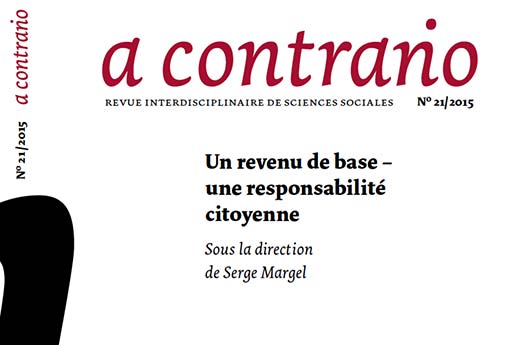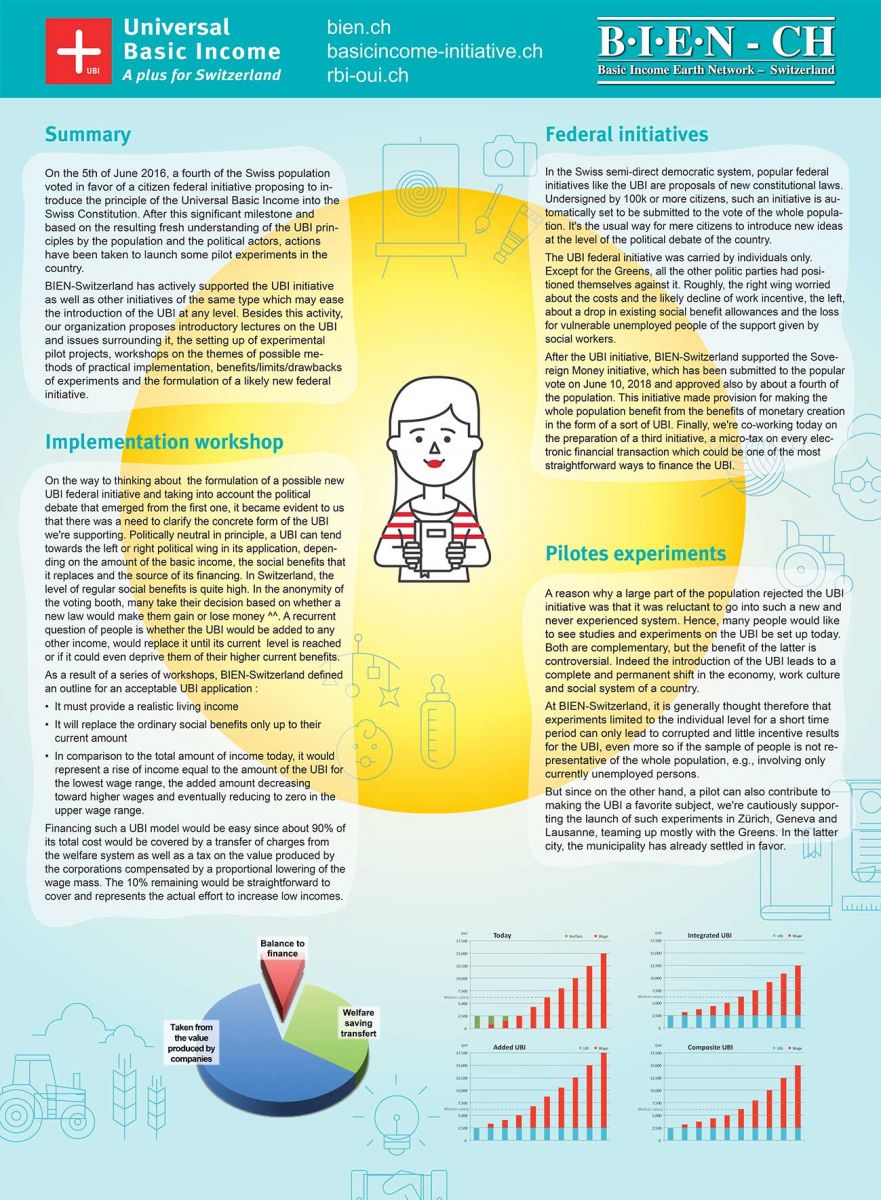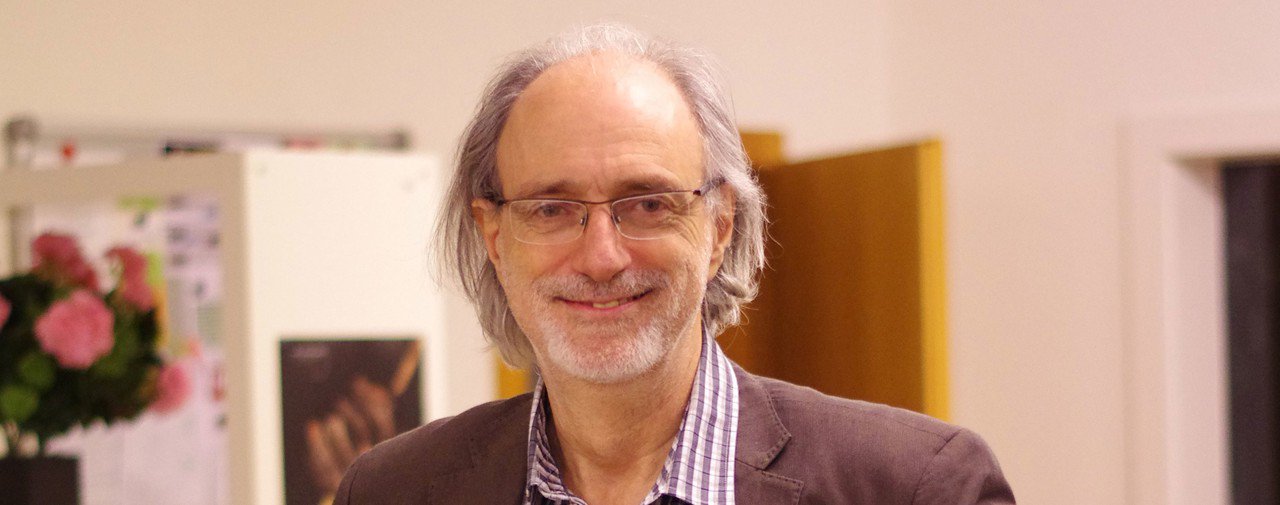Basic Income Earth Network - Switzerland
Publication
Poster of BIEN-Switzerland for the 18th Congress of BIEN-International
Produced by BIEN-Switzerland, this poster was among those of other affiliated organizations at the 18th Annual BIEN (International) Congress in Tampere, Finland.
Summary
On the 5th of June 2016, a fourth of the Swiss population voted in favor of a citizen federal initiative proposing to introduce the principle of the Universal Basic Income into the Swiss Constitution. After this significant milestone and based on the resulting fresh understanding of the UBI principles by the population and the political actors, actions have been taken to launch some pilot experiments in the country.
BIEN-Switzerland has actively supported the UBI initiative as well as other initiatives of the same type which may ease the introduction of the UBI at any level. Besides this activity, our organization proposes introductory lectures on the UBI and issues surrounding it, the setting up of experimental pilot projects, workshops on the themes of possible methods of practical implementation, benefits/limits/drawbacks of experiments and the formulation of a likely new federal initiative. [+]
- Print node
- Login to post comments
- 7749 reads
As soon as 2016?
The president of SwissICT, Thomas Flatt is in favor of unconditional basic income (referendum on June 5th):
Computer scientists have finally arrived in the real world. We're now part of the establishment. Not only are our representatives suddenly present in parliament, we were also present at the WEF (World Economic Forum). Plus, the main subject of the forum were our very own inventions. Like always, bad news sells better than good news. That's why recently we've seen a lot of headlines stating that in the next few years 5 million jobs will be lost in the industrialized world. This study is rather conservative though, since others estimate that in the next 10 to 20 years we'll loose about 50% of our jobs.
However IT (Information Technology) also creates new jobs, many in fact. That's at least what our optimists say. Sure, IT will create new jobs and it'll be easy to train all the dismissed taxi drivers, industrial workers, and call-center workers into robot specialists and software developers. It's even easier than the job-search for a 50 year old computer scientist. But let's not fall into pessimism. We've survived the invention of electricity, of the steam engine, of the railway, of cars and of many other inventions. Industries and jobs came and went and were replaced by new ones. The same thing will happen this time - or will it? Either way, the winners will be those who anticipate what might happen in 5 to 10 years, and those who prepare their goods and services for this world of tomorrow. [+]
- Print node
- Login to post comments
- 9197 reads
An unconditional basic income is a logical response to how the economy is evolving

Ralph Kundig – Published on Friday, February 5th, 2016 on LeTemps.ch (FR)
An unconditional basic income (UBI) for everyone, the subject of a popular vote in Switzerland on 5 June 2016, is - according to Ralph Kundig - the logical response to developments in the economy. These imply less and less connection between employment and the economy, and consequently between employment and the social safety net. Ralph is the president of BIEN-Switzerland, the association fighting to introduce an UBI in Switzerland
Big data, learning machines, digitization, open source: all are developments which threaten jobs, even highly qualified ones. Unemployment is rising and social security costs are mushrooming, with fewer and fewer workers to pay for it and feeble economic growth. The way things are going means that neither the economy nor social security can any longer remain dependent on employment.
We are already seeing that salaries no longer bear much relation to the usefulness of the work done. The proportion of the population whose revenue is derived from work is a mere 40%; all the others accomplish tasks which are equally necessary to value creation but are unpaid, such as caring for family, learning, volunteer work or art and culture. In the 21st century, the concept of paid work as the sole source of income, social integration and human value creation has become obsolete.
- Print node
- Login to post comments
- 10110 reads
A number of "A Contrario" on the basic income
The twenty-first edition of the interdisciplinary social science journal « A Contrario », entirely devoted to basic income, was published:
« Un revenu de base – une responsabilité citoyenne » A basic income - a civic responsibility
A contrario N°21, Serge Margel (dir.), 172 pages.

Online consultation on Cairn.info and sale on the e-readers.ch. [+]
- Print node
- Login to post comments
- 10903 reads
New book about the UBI « What is missing when everything is there? »
A new book on the RBI, written by Daniel Häni and Philip Kovce, just released «Was fehlt, wenn alles ist da?» (What is missing when everything is there?)
Why the unconditional basic income raises the good questions.

The unconditional basic income dramatically raises the question of self-determination of a person: what work would you do if you had no need to earn a living? What do you think you are capable of, and what the others? [+]
- Print node
- Login to post comments
- 15268 reads






